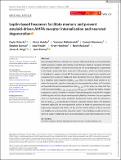Files in this item
Leptin-based hexamers facilitate memory and prevent amyloid-driven AMPA receptor internalisation and neuronal degeneration
Item metadata
| dc.contributor.author | Doherty, Gayle H. | |
| dc.contributor.author | Holiday, Alison | |
| dc.contributor.author | Malekizadeh, Yasaman | |
| dc.contributor.author | Manolescu, Cosmin | |
| dc.contributor.author | Duncan, Stephen | |
| dc.contributor.author | Flewitt, Iona | |
| dc.contributor.author | Hamilton, Kirsty | |
| dc.contributor.author | MacLeod, Beth | |
| dc.contributor.author | Ainge, James | |
| dc.contributor.author | Harvey, Jenni | |
| dc.date.accessioned | 2022-12-15T15:30:04Z | |
| dc.date.available | 2022-12-15T15:30:04Z | |
| dc.date.issued | 2023-06-01 | |
| dc.identifier | 282303180 | |
| dc.identifier | d08d12ea-4edb-4636-a585-8da5b6ed9bdf | |
| dc.identifier | 85144146529 | |
| dc.identifier | 000899130500001 | |
| dc.identifier.citation | Doherty , G H , Holiday , A , Malekizadeh , Y , Manolescu , C , Duncan , S , Flewitt , I , Hamilton , K , MacLeod , B , Ainge , J & Harvey , J 2023 , ' Leptin-based hexamers facilitate memory and prevent amyloid-driven AMPA receptor internalisation and neuronal degeneration ' , Journal of Neurochemistry , vol. 165 , no. 6 , pp. 809-826 . https://doi.org/10.1111/jnc.15733 | en |
| dc.identifier.issn | 0022-3042 | |
| dc.identifier.other | ORCID: /0000-0003-3494-5857/work/124889130 | |
| dc.identifier.other | ORCID: /0000-0002-0007-1533/work/124889146 | |
| dc.identifier.uri | https://hdl.handle.net/10023/26606 | |
| dc.description | Funding: This work was supported by a Medical Research Scotland vacation award for BM, Sulsa Dementia grants to JH & GHD. | en |
| dc.description.abstract | Key pathological features of Alzheimer’s disease (AD) include build-up of amyloid β (Aβ), which promotes synaptic abnormalities and ultimately leads to neuronal cell death. Metabolic dysfunction is known to influence the risk of developing AD. Impairments in the leptin system have been detected in AD patients, which has fuelled interest in targeting this system to treat AD. Increasing evidence supports pro-cognitive and neuroprotective actions of leptin and these beneficial effects of leptin are mirrored by a bioactive leptin fragment (leptin116-130). Here we extend these studies to examine the potential cognitive enhancing and neuroprotective actions of eight six-amino acid peptides (hexamers) derived from leptin116-130. In this study, we show that four of the hexamers (leptin116-121, 117-122, 118-123 and 120-125) replicate the ability of leptin to promote α-amino-3-hydroxy-5-methyl-4-isoxazolepropionic acid (AMPA) receptor trafficking and facilitate hippocampal synaptic plasticity. Moreover, the pro-cognitive effects of the hexamers were verified in behavioural studies, with administration of leptin117-122 enhancing performance in episodic memory tasks. The bioactive hexamers replicated the neuroprotective actions of leptin by preventing the acute hippocampal synapto-toxic effects of Aβ, and the chronic effects of Aβ on neuronal cell viability, Aβ seeding and tau phosphorylation. These findings provide further evidence to support leptin and leptin-derived peptides as potential therapeutics for AD. | |
| dc.format.extent | 18 | |
| dc.format.extent | 14878186 | |
| dc.language.iso | eng | |
| dc.relation.ispartof | Journal of Neurochemistry | en |
| dc.subject | Leptin | en |
| dc.subject | Alzheimer's disease | en |
| dc.subject | Synaptic plasticity | en |
| dc.subject | Amyloid | en |
| dc.subject | Memory | en |
| dc.subject | Hippocampus | en |
| dc.subject | Tau | en |
| dc.subject | BF Psychology | en |
| dc.subject | RC Internal medicine | en |
| dc.subject | DAS | en |
| dc.subject | MCC | en |
| dc.subject.lcc | BF | en |
| dc.subject.lcc | RC | en |
| dc.title | Leptin-based hexamers facilitate memory and prevent amyloid-driven AMPA receptor internalisation and neuronal degeneration | en |
| dc.type | Journal article | en |
| dc.contributor.sponsor | Scottish Funding Council | en |
| dc.contributor.institution | University of St Andrews. Centre for Biophotonics | en |
| dc.contributor.institution | University of St Andrews. School of Psychology and Neuroscience | en |
| dc.contributor.institution | University of St Andrews. Institute of Behavioural and Neural Sciences | en |
| dc.identifier.doi | https://doi.org/10.1111/jnc.15733 | |
| dc.description.status | Peer reviewed | en |
| dc.identifier.grantnumber | en |
This item appears in the following Collection(s)
Items in the St Andrews Research Repository are protected by copyright, with all rights reserved, unless otherwise indicated.

